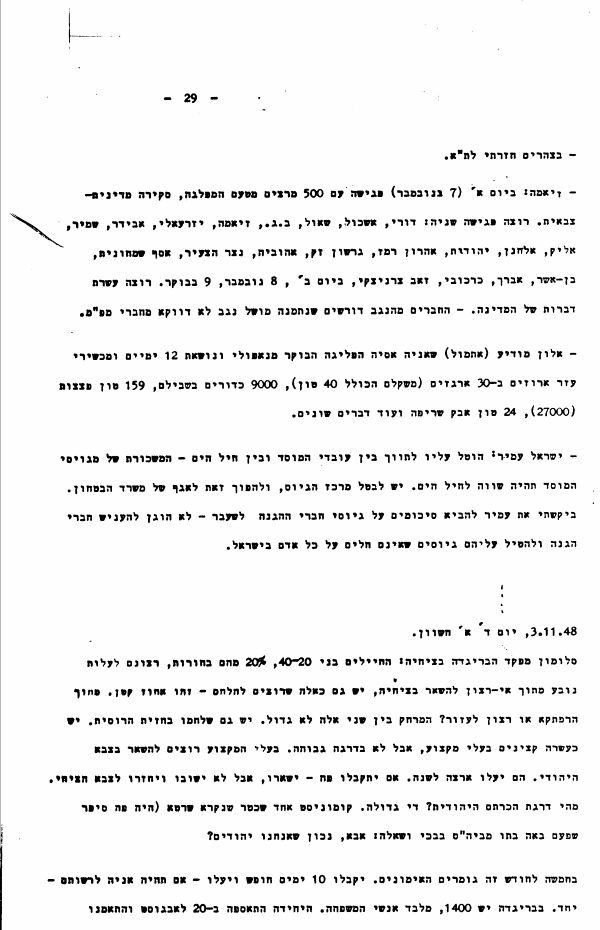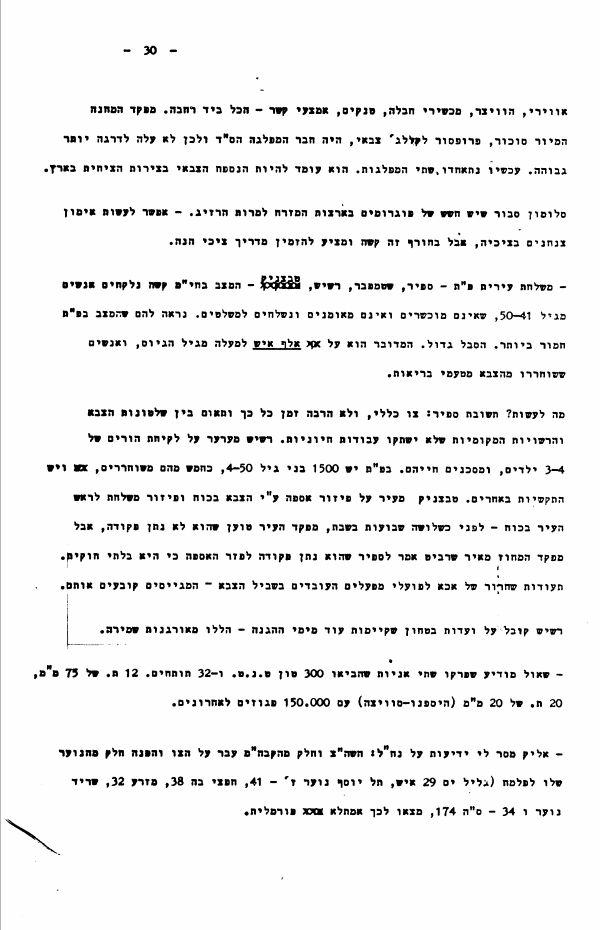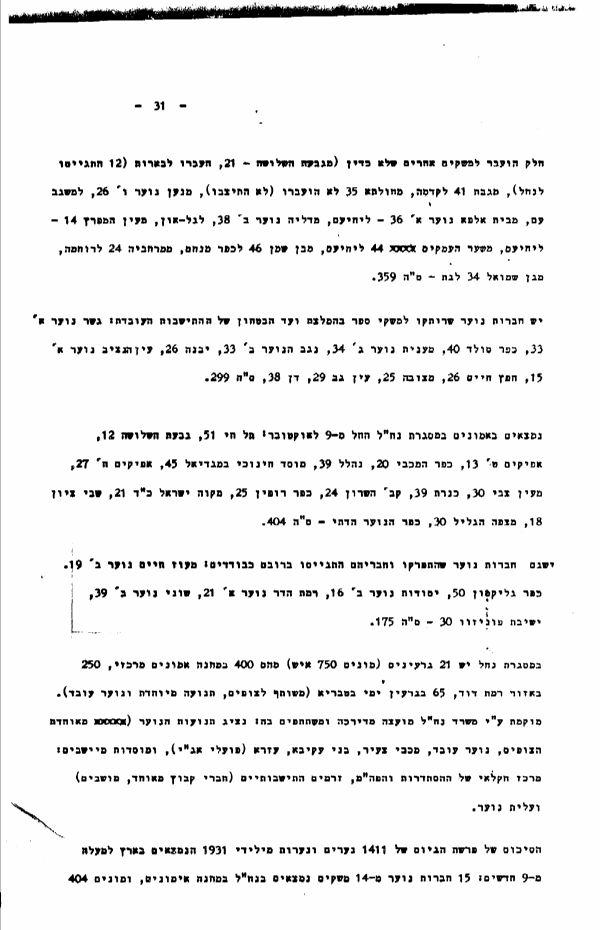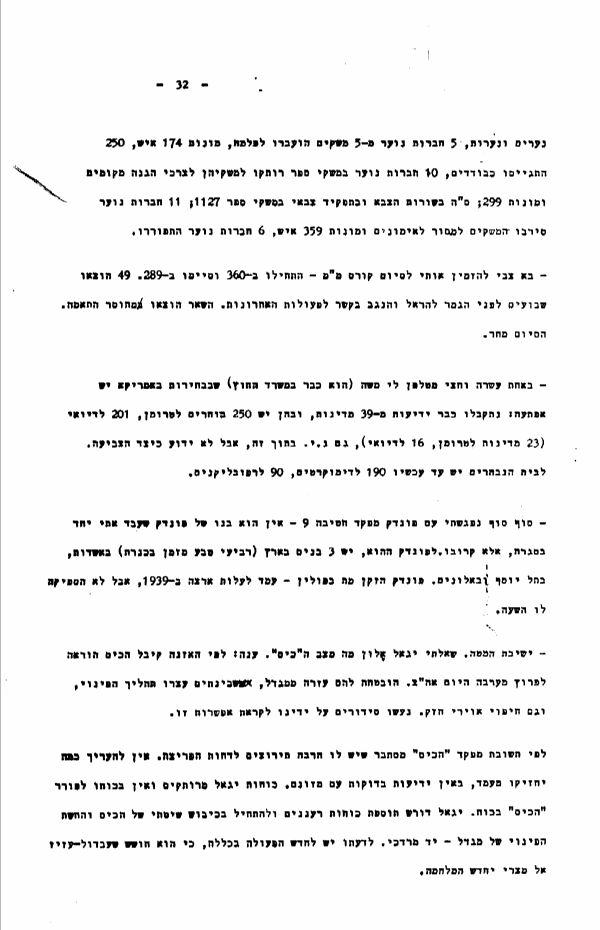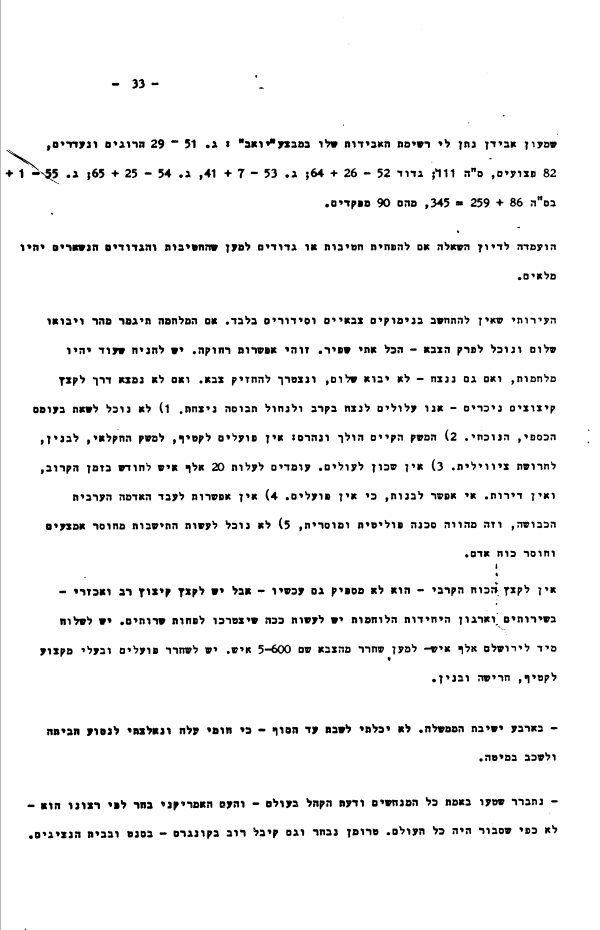Wednesday, November 3, 1948
Yaacov [Yankele] Salomon [sp.], commander of the brigade in Czechoslovakia: The soldiers are ages 20-40, some of them women, their interest in immigrating here stems from not wanting to remain in Czechoslovakia; there are also some who want to fight [in the war] - this is a small percentage.
Out of a sense of adventure or a desire to help? - The gap between these two is not great. Some also fought on the Russian front, there are about ten officers with a profession, but not high ranking. The professionals want to remain in the Jewish army. They'll come to the country for a year. If they fit in here - they'll stay; if not - they'll return to the Czech army.
How great is their Jewish awareness? - Pretty significant. One communist, Schechter, called Shechta [sp.] (he was here), recounted how his daughter once came home from school crying and asked: Papa, is it true that we're Jews?
On the fifth of this month [they] finish training. They'll have 10 days off and will come here - if there's a ship available - together. There are 1,400 in the brigade, excluding family members. The unit assembled on August 20 and trained for about two months. The [Czech] government provided a camp, 4 instructors, and weapons for training - anti-tank, anti-air weapons, howitzer, sabotage devices, tanks, signal equipment - all generously. The camp commander - Major Sohor [sp.], a military college professor, was a member of the Social-Democratic Party and therefore didn't rise to a higher rank. Now the two parties have merged. He'll be the military attaché at the Czech legation in the country.
Salomon thinks there's cause for concern about pogroms in Eastern [European] countries despite the regime. It's possible to carry out paratrooper training in Czechoslovakia, but in the winter it's hard and he proposes inviting a Czech instructor here. [Paratrooper training in Israel began that autumn, in a unit commanded by Yoel Palgi.]
A delegation from the Petah Tikva municipality - [Yosef] Sapir, [Shlomo] Stampfer, [Pinhas] Rashish, [David] Tabachnik - the situation in the garrison is difficult. Men aged 41-50, who are neither skilled nor trained, are being taken and sent to strongholds. It seems to them that the situation in Petah Tikva is especially severe. The hardship is intense, as it involves a thousand men over draft age, and men who were released from the army for reasons of health.
What should be done? - Sapir's answer: a general order, and not for so long, and coordination between the military authorities and the local authorities, so that they won't paralyze vital works. Rashish objects to parents with 3-4 children being taken and endangering their lives. In Petah Tikva there are 1,500 [men] aged 40-50, [illegible word] of them were released, and there's rigidity [a hardening of positions] regarding the others. Tabachnik remarked on a gathering that was forcefully disbanded by the army, and a delegation to the mayor that was forcefully disbanded - about three weeks ago on Saturday. The city commander claims that the order did not come from him, but from the [Tel Aviv] District commander. Meir Sharvit told Sapir that he'd issued the order to disband the gathering, because it was illegal. The Personnel Department's certificates of release for workers at factories that serve the army - the recruiters tear them up.
Rashish complains about defense committees that have existed since the time of the Haganah - they're organizing guard duty.
- Shaul [Avigur] reports on the unloading of two ships that brought 300 tons of TNT and 32 cannons: 12 75 mm C. [cannons], 20 20 mm C. (Hispano-Suiza) with 150,000 shells for the latter.
- Elik [Shomroni] gave me news about NAHAL [No'ar Halutzi Lohem - Pioneer Fighting Youth, a combined military service and agricultural settlement program]: HaShomer HaTza'ir and some of HaKibbutz HaMeuchad disobeyed the order and referred some of their youth to the Palmach (Glil Yam 29 persons, Tel Yosef No'ar Zayin [Youth Group 7] - 41, Heftziba 38, Mizra 32, Sarid No'ar Vav [Youth Group 6] 34 - total 174, they found an official pretext for this.
Some were illegally transferred to other settlements (from Giv'at HaShlosha -21, transferred to Be'erot (12 enlisted in NAHAL), from Geva 41 to Kedma, from Hulata 35 weren't transferred (didn't show up), from Na'an No'ar Vav [Youth Group 6] 26, to Misgav Am, from Bet Alpha No'ar Aleph 36 - to Yehiam, from Dalia No'ar Bet 38, to Gal On, from ''Ein HaMifratz 14 - to Yehiam, from Sha'ar HaAmakim 44 to Yehiam, from Ben Shemen 46 to Kefar Menahem, from Merhavia 24 to Ruhama, from Gan Shmuel 34 to Gat - total 359[)].
There are youth groups that were confined to outlying settlements [near the border] at the recommendation of the labor-settler movements' defense committee: Gesher No'ar Aleph [Youth Group 1] 33, Kefar Szold 40, Ma'anit No'ar Gimel [Youth Group 3] 34, Negev No'ar Bet [Youth Group 2] 33, Yavne 26, Ein HaNatziv No'ar Aleph [Youth Group 1] 15, Hafetz Haim 26, Matzuva 25, ''Ein Gev 29, Dan 38, total 299.
In training as part of NAHAL since October 9: Tel Hai 51, Giv'at HaShlosha 12, Afikim Tet 13, Kefar HaMaccabi 20, Nahalal 39, Magdiel educational institute 45, Afikim Het 27, Ma'ayan Zvi 30, Kinneret 39, Kv[utzat] HaSharon 24, Kefar Ruppin 25, Mikve Yisrael K.D. [?] 21, Shavei Zion 18, Mitzpe HaGalil 30, Kefar HaNo'ar HaDati - total 404.
There are some youth groups that disbanded and most of their members enlisted as individuals: Ma'oz Haim No'ar Bet [Youth Group 2] 19, Kefar Glikson 50, Yesodot No'ar Bet [Youth Group 2] 16, Ramat Hadar No'ar Aleph [Youth Group 1] 21, Shoni [?] No'ar Bet [Youth Group 2] 39, Ponizev [i.e., Ponevezh Yeshiva?] Yeshiva 30 - total 175.
Within NAHAL there are 21 core [settlement-designated] groups (numbering 750 persons), of whom 400 are in a central training camp, 250 in the Ramat David area, 65 in a naval core group in Tiberias (in partnership with the Tzofim [Scouts], Tnu'a Meyuhedet [literally, "special movement"; perhaps the intent was to write Tnu'a Meuchedet (the name of a youth movement)?], and No'ar Oved).
The NAHAL office has set up a training council in which [the following] are participating: representatives of youth movements ([HaTnu'a] HaMeuchedet, HaTzofim [Scouts], No'ar Oved, Maccabi Tza'ir, Bnei Akiva, Ezra (Po'alei Agudas Israel) and settlement institutions: the Histadrut's agricultural center and HaPo'el HaMizrachi, settlement movements (members of Kibbutz Meuchad, moshavim) and Aliyat [Ha]No'ar [immigrant youth programs].
The total enlistment comprises 1,411 boys and girls born in 1931 who have been in the country more than nine months: 15 youth groups from 14 settlements are in NAHAL at a training camp and [they] number 404 boys and girls; 5 youth groups from 5 settlements were transferred to Palmach [against orders], numbering 174 persons; 250 enlisted as individuals; 10 youth groups in outlying settlements [near the border] were confined to their settlements for purposes of local defense and they number 299; total in the army and in military positions in outlying settlements 1,127; the settlements refused to deliver for training 11 youth groups numbering 359 persons; 6 youth groups disbanded.
- Zvi [Hurwitz] came to invite me to the graduation of a PC [officers, platoon commanders] course - they started with 360 and finished with 289. 49 were taken out two weeks before the end for Harel and the Negev in relation to the recent actions [Operation Yoav and Operation El HaHar]. The others were taken out for lack of suitability. The graduation is tomorrow.
- At 11:30 Moshe [Sharett] telephoned me (he's already at the Foreign Ministry [returned from Paris]), [and said] that there's a surprise in the American elections: the results have already come in from 39 states, and they include 250 electors for Truman, 201 for [Thomas] Dewey [the Republican candidate, Governor of New York] (23 states for Truman, 16 for Dewey), this includes New York, but it's not clear how it voted. So far the House of Representatives has 109 Democratic [representatives], 90 Republicans.
- Finally I met with [Yitzhak] Pundak, commander of the 9th Brigade [Oded] - he isn't the son of the Pundak who worked with me in Sejera, but is related to him - that Pundak has three sons in the country (a fourth drowned long ago in the Kinneret [Sea of Galilee]); in Ashdot [Ya'akov], Tel Yosef, and Alonim. The older Pundak died in Poland - he was going to immigrate here in 1939, but didn't make it.
- [General] Staff meeting. I asked Yigal Allon about the situation in the "pocket." He answered: According to eavesdropping [reports], the "pocket" was instructed to invade westward this afternoon. They were promised assistance from Majdal - which halted its evacuation in the meantime - as well as strong aerial coverage. Arrangements were made by us in the event of this possibility.
According to the reply from the "pocket" commander, he apparently has many excuses to postpone the invasion. [We] can't assess how long they'll hold on, without confirmed information about their food [supplies]. Yigal's forces are engaged and he doesn't have the strength to disband the "pocket" forcefully. Yigal demands additional fresh forces and to start the systematic conquest of the "pocket" and expedite the evacuation of the Majdal - Yad Mordechai [area]. In his view the action should be resumed in its entirety, because he's concerned that ''Abd al-Aziz al-Masri [sp.] [commander of the Muslim Brotherhood in the Mount Hebron area] will resume the fighting.
[Givati Commander] Shimon Avidan gave me the list of his losses in Operation Yoav: Battalion 51 - 29 killed and missing, 82 wounded, total 111; Battalion 52 - 26 + 64; Battalion 53 - 7 + 41; Battalion 54 - 25 + 65; Battalion 55 - 7 + 7, total 86 + 259 = 345, of whom 90 [were] commanders.
The question was raised as to whether to reduce [the number of] brigades or battalions so that the remaining brigades and battalions would be full. I commented that [we] shouldn't only consider military and organizational reasons. If the war ends tomorrow and peace comes and we can disband the army - all will be well. This possibility is remote. We should assume that there will be more wars, and even if we win - peace will not come, and we'll have to maintain an army. And if we don't find a way to make significant cuts - we might win the battle and suffer a permanent defeat [because] 1) We won't be able to bear the present financial burden. 2) The existing economy is steadily crumbling: there are no workers for the fruit harvest, the agricultural economy, construction, civilian industry. 3) There's no housing for immigrants. In the near term there are going to be 20,000 immigrants monthly and there are no apartments. It's not possible to build because there are no workers. 4) It's not possible to cultivate the conquered Arab land, and this poses a political and moral danger. 5) We won't be able to carry out the settlement enterprise for lack of means and lack of manpower.
The combat capacity should not be cut - even now it's not enough - but [we] should cut - substantially and brutally cut - services, and combat units should be organized in such a way that they'll need fewer services. A thousand men should be sent to Jerusalem immediately - in order to release 500-600 men from the army there. Workers and professionals should be released for the fruit harvest, plowing, and construction.
- At 4 government meeting. I couldn't stay to the end - because my fever rose and I had to go home and go to bed.
- It turned out that all the guessers and public opinion around the world really got it wrong, and the American people chose for itself - not according to what the entire world believed. Truman was elected, and also received a majority in the Congress, [both] the Senate and the House of Representatives.





